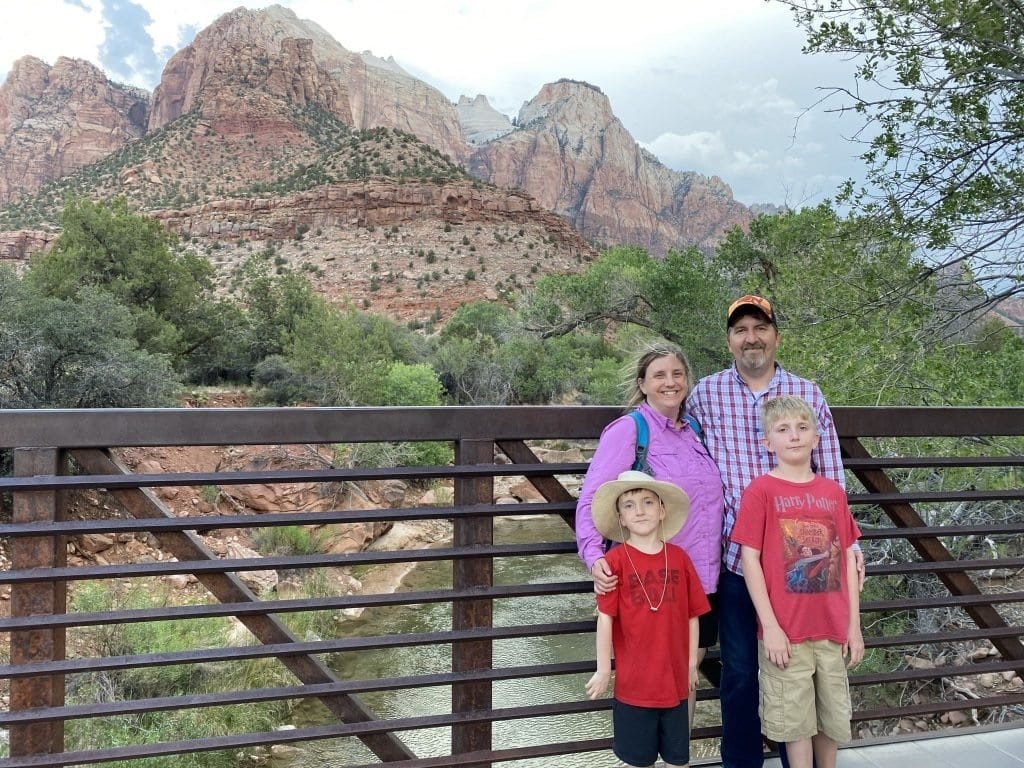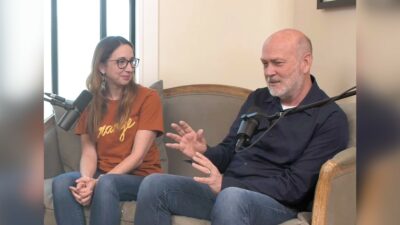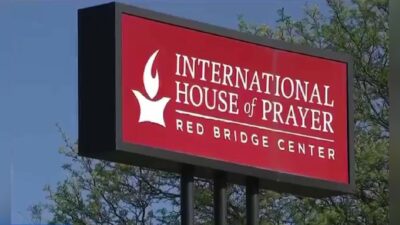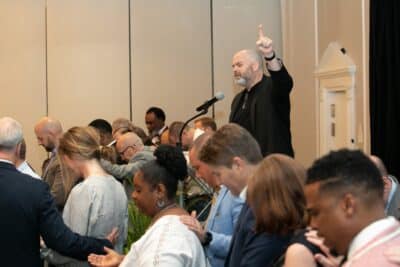Scott Elliott, minister for the 120-member La Grange Church of Christ in Texas, watched as friends and acquaintances left full-time ministry nearly every week.
Seeking to help others, Elliott did what many others had during the Pandemia de COVID-19.
He turned to social media.
On Facebook, he shared resources about burnout and sabbaticals. While not typical in Churches of Christ, sabbaticals are customary in several Christian denominations.
Elliott didn’t expect his elders to give him a sabbatical, but they encouraged him to take one after reading the resources he posted online.
Your tax-deductible gift helps our journalists report the truth and hold Christian leaders and organizations accountable. Give a gift of $30 or more to The Roys Report this month, and you will receive a copy of “Hurt and Healed by the Church” by Ryan George. To donate, haga clic aquí.
He welcomed his first extended break in 18 years of ministry.
“I don’t think a lot of people understand that in ministry if you have a week off, you never really stop,” Elliott said. “You may have that one Sunday off, but you’re always thinking about the next Sunday when you have to preach or the next class or having to preach or whatever’s going on in the congregation.”
los pandemic amplified existing ministerial stress. Congregations looked to their ministers to launch remote pulpits, decide how and when to gather and navigate political tensions.
When Allen Carr transformed his guest bedroom into the remote pulpit for his congregation’s virtual Sunday services, the thin line between work and life became nonexistent, he said.
For 16 years, Carr had navigated a career in ministry that went beyond the boundaries of a 9-to-5 job.
Calls came in the night from members of the congregation. Funerals interrupted time off. And the weekly sermons weren’t going to write themselves.
Carr, former minister for the Oakcrest Church of Christ in Oklahoma City, recalled one of the elders asking his wife during the job interview, “Are you going to be OK about all the other times, all the extraneous times, that he’s going to have to be away — whether that’s because he’s in a hospital room or because of a meeting?”
Carr knew his time in ministry would eventually end. However, the stress from the pandemic accelerated his decision to leave this past May.
“This isn’t what I want to do,” Carr said he eventually realized. “I was not happy on the basic level. … I realized that this was untenable.”
An October poll by the Barna Group found that 38% of U.S. ministers had considered leaving full-time ministry within the past year — a 9% increase from a poll in January.
A similar estudio released by the Instituto de Hartford para la Investigación de la Religión found that 67% of the ministers across 38 Christian groups thought this past year was the most difficult in their ministry, with 37% seriously considering leaving ministry at least once.
Further research conducted by Barna in 2021 found only 60% of ministers reported their emotional well-being as good or excellent. That self-reported number was 85% five years ago.
Congregations seeking full-time ministers are in no shortage. Monthly ads published in La crónica cristiana and posted online by The Jenkins Institute show a growing need for leadership.
But it is not just a state of unhappiness causing ministers to leave.
Bobby Kern spent a decade in family ministry and works as an associate professor of family science at universidad cristiana de oklahoma. He spoke at the KERYGMA Preaching Conference about secondary traumatic stress — a condition ministers are predisposed to as caregivers of their congregations.
Kern believes that stress is contributing to ministerial burnout.
“You’ve got church members who are struggling with the pandemic itself,” Kern said. “You’ve got church members who are contracting the virus. You’ve got church members who have died from the virus. You’ve got church members that are split down the middle on things like masks and vaccines in relation to the pandemic.
“And ministers are taking on all of that from all of their members, and they don’t necessarily have the outlet to decompress that themselves. That’s all on top of the individual ministers themselves and their families living through a pandemic, trying to figure out this virus, and make their own decisions about things. The list goes on and on.”
An investment in the future
The Episcopal Church provides guidelines for sabbaticals under provisions for clergy wellness and care. The Episcopal Diocese of Texas requires that agreements between clergy and their congregations include provisions for sabbatical leave, stating that it is vital for clergy wellness.
While the length of sabbatical leave varies with each Christian group, many offer three months away from ministerial duties every seven years. The period of rest after six days and seven years is associated with the biblical concepts found in Genesis 2:2-3 y Leviticus 25:4-5, author Dan Wolyniak wrote in an installment of “The Pastor’s Advocate Series,” published by Focus on the Family.
With frameworks for taking sabbaticals scarce among the Churches of Christ, some church leaders have turned to resources created by other groups. Others — like the 2,300-member Memorial Road Church of Christ in Oklahoma City — created their own sabbatical handbook.
Former elder Bailey McBride and Josh Kingcade, Memorial Road’s minister of adult education, began creating a sabbatical handbook in 2017 after realizing the majority of their ministerial staff had served in full-time ministry for several years.
“We started to think, ‘If long-tenured staff is a good thing and something a church desires, then what could we do to support that long tenure?’” Kingcade said. “I might say it a different way, which is, ‘How do you keep people from burning out?’”
Their efforts resulted in a document that defined the eligibility and requirements for a sabbatical, including a year of preparation with a sabbatical committee composed of elders, church members and fellow ministerial staff. The reason for the long-term planning, Kingcade said, was to foster intentionality in how ministers spent their time away from the congregation.
“A sabbatical is not just a reward for hard work,” Kingcade said. “It is an investment in the future of that minister and his or her ministry to that church. In other words, it’s a way to keep your ministers performing well, and it’s a benefit to your own church.”
The handbook noted three areas for ministers to focus on while planning their sabbatical: themselves, their family and their church.
Sabbaticals, unlike vacations, are an extended period of time for ministers to study, connect with other believers and focus on spiritual growth so they return to their congregations renewed.
Kingcade shared the handbook with Elliott, the Texas minister, before his four-week sabbatical in June and July 2021.
However, the sabbatical, which Elliott planned rather quickly, coincided with his family’s preexisting plans. Elliott spent the first day of his sabbatical behind the wheel, driving his wife, Laura, and eldest son to scout camp.
The following week, when his family reunited, he remained behind the wheel as they drove across the country visiting with other ministers and congregations — a privilege rarely afforded a full-time minister, Elliott said.
He found the communion with other ministers uplifting.
“It was encouraging to hear from guys who hadn’t left ministry and who were still committed,” Elliott told La crónica cristiana. “This is a unique time. Not only are there challenges, but there are opportunities. … But I also heard a lot of the ministers who are staying are feeling the same pressures as the ones who walked away from church.”
His family also benefited from the sabbatical, Laura Elliott said.
“Minister burnout is a real problem,” she said. “Ministers and their families give and give and give. If they don’t have the opportunity to fill up, all kinds of problems tend to ensue. Many ministry families struggle. It’s often just hidden until it boils over or erupts.
“If the family is struggling, the minister isn’t going to be able to place the focus needed on the congregation. Then the job becomes more stressful, and that, in turn, is projected on the family. It can be a vicious cycle.”
‘Don’t quit. Just take a break.’
One limitation to sabbaticals is congregation size.
Smaller congregations, common in Churches of Christ, present challenges when ministers seek to take an extended absence. While larger congregations can delegate responsibilities to elders and church members, smaller congregations may experience difficulty fulfilling ministerial duties while their minister is away on sabbatical.
Asheley Hepburn, minister for the Magnolia Park Church of Christ in Miami Gardens, Florida, initially believed taking a sabbatical would be burdensome on his congregation. His congregation of about 75 members had dwindled during the pandemic to an average of 25 members attending in-person worship, with others gathering virtually.
“The cost would be too high a burden,” Hepburn replied to a survey by the Crónica. “I am afforded vacation time, which I take.
“Sabbaticals are needed, but you’ve got to be able to have the backup to take them,” he said. “Somebody’s got to be able to preach on Sunday.”
However, the concept of sabbaticals remained in the back of Hepburn’s mind, and he began to question his original response. When he later mentioned it to his wife, she advised him to take time off.
“She said, ‘Yeah, you need to take a break. You’re going to burn yourself out if you keep on going that way,’” Hepburn recalled.
Ultimately, Hepburn agreed. While he was unable to take a full sabbatical, he needed a break from the pulpit. Ministers in the surrounding area agreed to cover his sermon responsibilities for the first three weeks of December.
“There’s a saying out there, and I don’t know who said it,” Hepburn said, “but I live by it these days: ‘When you get tired, don’t quit. Just take a break.’
“Even our savior, Christ, found time to get away. … I guess that’s the bottom line. You have to find a way to get away.”
Este artículo apareció originalmente en La crónica cristiana.
Audrey Jackson, graduada en periodismo en 2021 de la Universidad Harding en Searcy, Arkansas, es editora asociada de The Christian Chronicle para medios impresos y digitales.


















12 Respuestas
I can tell you this is epidemic, along with churches firing pastors/ministers for no good reason. My husband was a victim of that, and friends sent us to a retreat in Colorado. He had been beaten down so hard, and the best, humblest minister of the Word was near complete burnout and didn’t want to stay in ministry. He did, but, I began a ministry to pastors’ wives, who are many times the unsung heroes….and also who are often dying on the vine. Pastors’ families are hurting, and it has only gotten worse over the last couple of years. Churches and Christians are vehemently divided over a virus. It has created so much division and pain – God must weep. I can give you testimony after testimony of the wives who need this also and whom I have helped, along with wives, marriages and churches saved. They probably wouldn’t need it if they, along with their husbands, could have well-deserved sabbaticals. If Jesus needed time away and took His disciples with Him (or at least tried to) – how can we say we don’t. We had elders get mad because of the time my husband spent in the Word and prayer, preparing for teaching of God’s word. They hounded him because he had hurt someone’s feeling, but wouldn’t tell him who. “They” are upset, was what they would always say. He begged them to tell him and asked them to go alone with him, but they wouldn’t. They just held it against him. The church that fired him never recovered. More than half left because of the evil inflicted on us. We’ve moved on, but so many lives were affected.
Laura, I’m so sorry your family went through that. Spiritual abuse, whether it comes from the top down or the bottom up, eventually devastates the whole body if uncorrected.
“We’ve moved on, but so many lives were affected.” It would be okay if you haven’t yet. Grief has no schedule.
Thank you, Mr. Gunderson. I guess if I’m going to be honest, there are times it really does still sting. My husband does his own international ministry now and I have mine, but there are times he still hurts, and I do too. He said if he never sits in an elder’s meeting again, it will be fine. He was railed on severely, and basically abused. One elder eventually apologized, but the church has never been the same. Again, thank you for recognizing the pain. It was about 17 years ago.
There are deep issues involved in what this article addresses. A structure emerges which includes doctrine, Church and leader/Pastor. Across all that, a process of faith plays out: collective or congregational faith, and intertwined individual faith. What do we end expecting of our Church/faith leader/Pastor.
I think of this dynamic, when report is made of a Pastor/leader falling from grace. Very often condemnation and need for redemption focuses on the fallen individual. I then wonder just how the elevation and expectation we subject that leader/Pastor to, could eventually play part in their downfall from grace.
So other aspects of Church, as well as burnout across expected burden of office, could be taken into consideration when we reflect on just how we might collectively safeguard and nurture our leaders/Pastors. Could we individually take up some of the deep burden we currently place on them. If so, just how.
A survey is needed to explore a deeper set of commonalities that may exist among the CoVid Exiteers. Might there be an ideological thread that runs through them that involves a sickened ftatigue with what Christianity in America has become? Perhaps this mass sabbtical season could preceed the emergance of a new movement made of these leaders and the churches they may someday plant under a renewed banner of authentic Christianity free of politics, tribalism and persecution complex.
As one pastor who quit last July after 30+ years to save my sanity, I wonder if we are as those who fled Jerusalem to Pella to wait out the self imposed destruction of an old out dated ideological/institutional framework that had mutated too far from our founders heart.
I have seen the evident problem here. It is that the whole of the modern church structure or what we think of as a church and how it should be lead is simply wrong. We have drifted away from having Jesus be God and we have taken one of the 18 gifts, elevated it to where it is an utter idol that pretty much always replaces Jesus Christ, and then everyone expects it to work. “Pastors” have become gods unto themselves and the people look up to them to do what only the Holy Son of God can do. We the people are idolaters and those who become pastors, reverends, priest or whatever you want to call them expect themselves to do all 18 gifts when, at most, none are gifted in more than a few of all those gifts. The structure must be torn down and replaced with something where “pastors” are not the ones who are kings. All of the gifts are equal. This is why there is burnout. The expectations of everyone are simply stupid.
Pastors need to point people to Jesus and then get out of the way. They need to stop being kings and share authority and responsibility with others and just become like everyone else. This is who they are. If this was realized there would be no burnout.
@Ralph – Those are some pretty broad brush statements. The apostle Paul lists the sufferings that he had experienced in serving Christ in 2 Corinthians 11:16ff.
Paul also writes: 2Co 7:6-7 “But God, who comforts the depressed, comforted us by the coming of Titus; (7) and not only by his coming, but also by the comfort with which he was comforted in you, as he reported to us your longing, your mourning, your zeal for me; so that I rejoiced even more.” Take some time to reflect on that!
I assume you have never been called or served as a pastor.
Wow. I agree, Don, a pretty broad brush. I’m surprised this was allowed because to me, this is a pretty “nasty tone.” It’s hard enough being in small church ministry. My husband certainly did not have the Messiah complex. That’s partly what caused so much trouble. He wouldn’t cater to everyone’s whims, he tried to be a peacemaker (to not much avail) and he treated everyone the same. We were paid pittance by most churches, but God always took care of us. Still, it’s changed me in how I view ministry and I hurt for so many like us who poured ourselves out for people (Christians) only to be attacked. My husband, the humblest of men I can tell you, would do anything for anyone and most ministers I know are the same way.
I firmly believe sabbaticals are a critical part of ministry longevity. I serve as a pastor in a normative sized SBC church (120-150 people involved). Pressure, stress, and bearing the burdens of others can easily leave a pastor and their family exhausted. It’s often difficult for pastors to effectively communicate the need for the type of rest sabbaticals provide. Few people truly understand the unique nature and stresses of senior leadership at a church. I had the benefit of serving in a “high stress” career for a decade prior to being a pastor. I was a police Seargent working in a high crime area near Dallas, Texas. I was accustomed to facing conflict, stress, and difficult situations in a daily basis. However, I can honestly say that the long-term pressure I’ve faced as a small-town pastor has exceeded the challenges and stress I faced in my law enforcement career. My wife and I were close to burnout after 8 years of serving in ministry. Thankfully, God graciously provided a sabbatical. I do not believe I would be in ministry today if God had not provided in this way. Along with the sabbatical, a very wise mentor help me put in place some healthy practices and disciplines. I believe when a pastor is close to burnout they will need to make significant life changes in their ministry practice in addition to taking a sabbatical. I have just completed my 10th year of ministry. I am now far more rested, joyful, and energetic. My sabbatical was an important part in my journey to health. Lastly, a small word of encouragement for any pastor reading this that knows they need a sabbatical but cannot imagine how it is possible…God can move mountains.
Dace, may our Lord continue to grant you effective ministry for Him and joy with your family. Interesting comparison in stress levels between previous work in law enforcement and ministry.
While we insist on the pastor being chief spiritual entertainer, we are doomed. The job of the minister/elder (of which pastoring is but one part) is to be a catalyst for the congregation to grow in faith. For a start, if there are no others who can give a talk (sermon is too intimidating a word), conduct a bible study, a reflection on a passage, or read a passage from some book and discuss it, things are bad. The Reformation merely replaced the priest with another priest, only no fancy clothes. It’s got to stop. Daryl Erkel has written well on this, if you can still find his essays (gracegems has some). A passive congregation is not on, so stop sending the congregation to the spiritual taxidermist.
What does the Bible teach about stress?